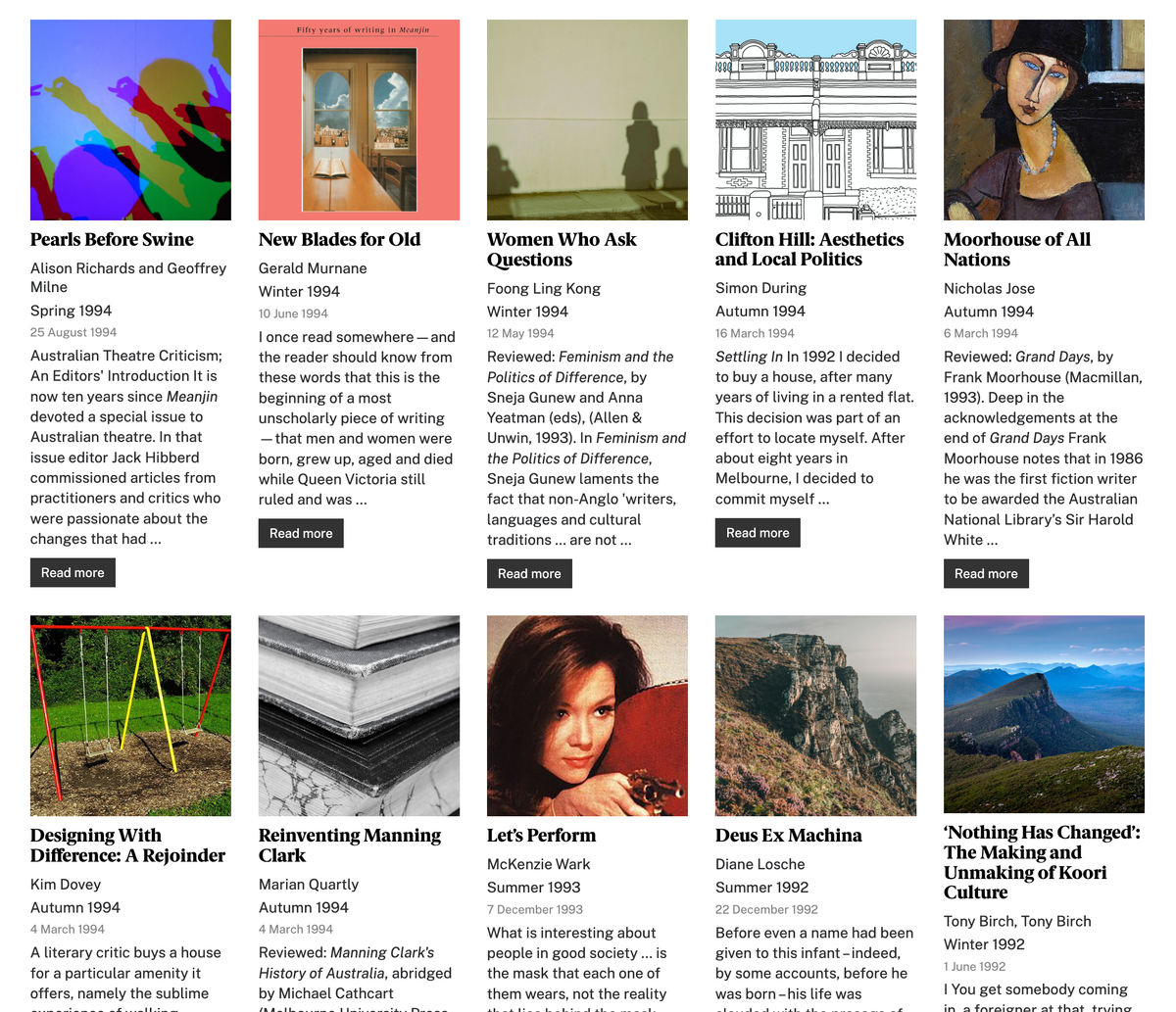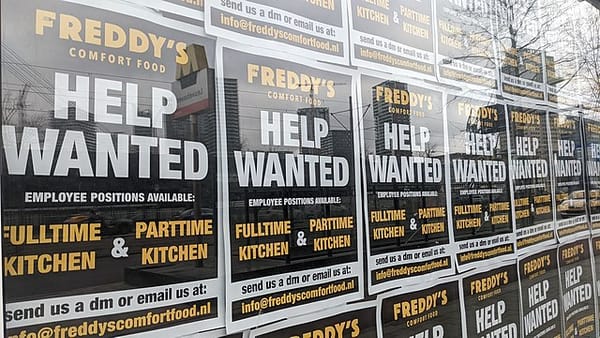So long, Meanjin
Meanjin down the drain, criticism still in crisis – plus Wuthering Heights and a withering review

I wrote for Crikey about the very abrupt decision to close Meanjin last week. This was a strange piece to write because all the usual questions you'd ask about such a decision remain largely unanswered. Whose decision was it? Why did it happen so fast and with so little ceremony? Why so much secrecy? The comments on record are, to date, straight from the corporate PR copybook and no one from Meanjin seems to have been able to speak publicly. Clearly there's more to be reported on this story and I hope that happens sooner rather than later. We do need to understand whether this was a consequence of editorial decisions – or a large neoliberal institution losing interest in funding a cultural organisation and giving it the flick. Neither is a great conclusion, imho. We've seen a serious erosion of freedom of expression for publicly funded cultural organisations (ie all cultural organisations) over the past two years; if it's true, as many people allege, that Meanjin was closed because it platformed pro-Palestinian writers, that's a grim escalation. But the alternative, that the University of Melbourne had just had enough of supporting Meanjin, is also mighty galling, and conforms to a different pattern that is also wretchedly familiar: the application of dead-eyed managerialism to the arts and humanities.
It's been put to me that literary magazines are ephemeral, and when established ones close, their absence creates a space for new magazines to thrive. This is less of a market metaphor than an ecological one. Tall timbers fall, saplings grow. Although I am, as I wrote for Crikey, quite sentimental about the connection to Australia's progressive history represented by magazines like Meanjin, I have some sympathy with this view. When cultural organisations become institutions, they can become hidebound and beholden to their own legacy. Not always the case, but it happens. And yet in Australia in 2025, the space left when a cultural organisation closes is hardly fertile terrain. It's more like a vacuum, one that sucks the life and energy out of small organisations and the people who try to run them. That is the vacuum of neoliberal managerialism, an ideology under which cultural organisations must furiously remake and rebrand themselves as delivering some kind of measurable value in order to survive.
A rash of commentary has made its way into print over the past two months in the US about the winnowing of cultural criticism from major publications. There's a good summary of the bad news here at NY Mag, in a piece that also gets to the heart of the matter: reviews, mostly, do not generate big audience numbers. Takedowns do, sometimes, and so does the occasional viral masterpiece, but mostly, there's a limited audience for reviews, especially as compared to other forms of cultural journalism, such as list, recommendations, and puffy features. There's a limited audience for literary journals too and if you're measuring the value of critical culture, and indeed literary culture, solely with attention to metrics of reach, audience engagement and income generation, you're missing the point. (At this juncture it feels important to note that the closure of Meanjin also involves the vaporisation of its reviews section, which has been helmed for the past few years by Cher Tan, which means less space for critical consideration of Australian literature. I remain of the opinion that when it comes to critical culture, more really is more: the more places there are for critics to hash out their ideas about new works of literature, the more places that can sustain and explore disagreements about ideas, the better. Dead-eyed consensus is bad for the culture.)
We should know by now that arguments about metrics alone are not going to persuade anyone to fund cultural organisations or reviews. If reach is the dominant metric, then cat videos trump criticism every single time, self-help books beat literary journals, no matter how good they are. Anybody running an arts organisation needs to be able to walk grant committees, boards, funders and donors through their balance sheets and make a quantitative case for their ongoing existence, whether in terms of reach or IP or future income or some other metric. What this sorry Meanjin episode shows us, again, is that we need to vigorously make the case that funding arts and culture, and indeed publishing criticism, is worthwhile on its own terms.
Researching another piece, I came across an open letter on the matter of public funding for literary journals published in 1963 in, you guessed it, Meanjin. Ah, the open letter, that immortal Australian literary form! This one is signed by the professors of English at Australian universities: I.R Maxwell, A.D Hope, W.A.G. Scott, A.C.Cawley, A.K. Thomson, S.L. Goldberg, George Russell, Allan Edwards, James McAuley, H.W. Piper, Colin Horne, H.J. Oliver. I can't find it in the Meanjin archive but it's available through Informit here if you have access. The situation of literary journals described by the gathered profs in 1963 merits citation at length:
The problem of all literary magazines is that they are necessarily addressed to a small audience. Two thousand subscribers is handsome support for an Australian journal of this sort. It is important that there should be several magazines representing different points of view. Under present-day publishing costs they cannot hope to compete any more than opera-houses or symphony orchestras can complete on their own resources and survive in this country. If they are more fortunate than opera, ballet or symphony orchestras in that they can maintain a bare existence without subsidies, their problem is essentially the same, and we would argue that the support of literature is as important to a country as the support of music or opera. The support of the latter by public subsidy is recognized. They are able to pay salaries to conductors, managers, artists and technicians without which they would not be able to exist at all. But our literary magazines are barely able to pay their printers. Their editors have to work without salary, they can make no more than token payments to their contributors, and they tend to live from one financial crisis to another, from which they are precariously ‘rescued’ by grants from the Commonwealth Literary Fund.
I wrote recently for Guardian Australia about a book that I'm sure will do well by any market metric you choose, Pissants by Brandon Jack. The novel is on the shelves in Big W, Ozlit's ultimate barometer of commercial viability. Pissants hasn't actually received many reviews, unlike Jack's debut memoir 28, which was acclaimed by a few critics I really rate; see for example Adam Rivett's careful reading in The Monthly. But Pissants, to which I would append a suite of synonyms such as immature, underdeveloped, infantile, doesn't really have any need of reviews, instead it's been lavished with "books coverage" of the type that Christian Lorentzen disparages in his 2019 Harper's essay, Like This Or Die. There was a Good Weekend profile of Jack timed to coincide with the launch and clutch of other puff pieces. This is unusual, to say the least, for a debut novelist. It has everything to do with Jack being a former Swans player and nothing to do with the quality of his writing or the future of Australian literature. Jack gives good content, clickable content: who cares whether his book is any good? My guess is that the Walk with...Brandon Jack published by Guardian Australia did much bigger numbers than my tetchy review. Unless I'm mistaken, Jack has not made his views on the fate of Meanjin known to his public. Anyway, here is my review.
And finally, a trailer for Emerald Fennell's new adapation of Wuthering Heights has been released, with Margot Robbie as Catherine Earnshaw. From Barbieland to the moors: what a journey. My favourite comment on the YouTube page? 'I am terribly upset by this trailer.' The Brontë fandom is NOT HAPPY. Me, I am deliriously entertained by the trailer, which is terrible, and joins a long history of bizarre adaptations of this most feral and glorious novel. Fennell is part of that cohort of Brontë readers who desperately wants Wuthering Heights to be a romance, as opposed to an anti-romance about intergenerational abuse. Her film will be released on the biggest date night of the year: Valentine's Day. Too bad all the film critics have been fired. But would this film garner the hatchet jobs it appears to mightily deserve? Barbie, if you'll recall, received a very soft landing. The exception? This polyphonic gem from N+1.


